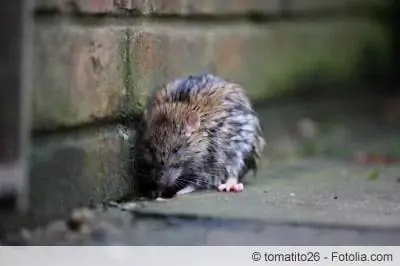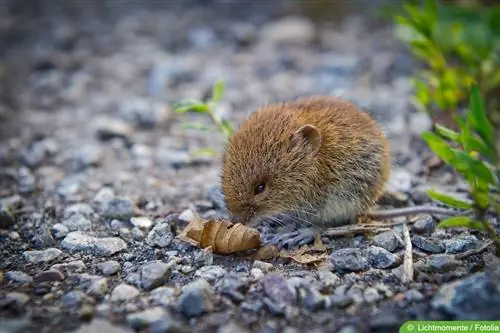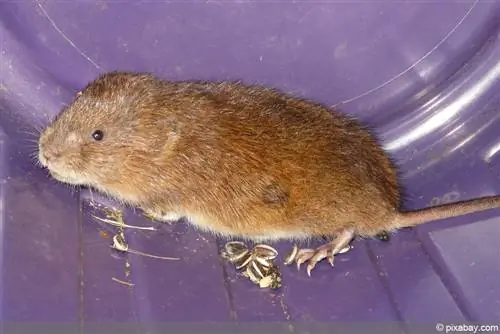- Author admin caroline@plants-knowledge.com.
- Public 2023-12-17 03:39.
- Last modified 2025-01-24 12:45.
Rats are clever animals. Some people even keep them as pets. However, these do not have much in common with the brown rats or house rats, which are among the pests. These are not welcome in the house and garden and should disappear as quickly as possible. Rats inspire disgust, but what's worse is that they can transmit disease. Poison bait is often resorted to or the pest controller is called. But there are alternatives. Before using poison, you should first try out alternatives.
Rats are difficult to fight because they are really smart and learn from mistakes. Once a method works, it rarely works the same way again. So you always have to come up with something new. Killing the animals should remain the absolute exception. More gentle measures are clearly preferable. Even if one control or expulsion strategy doesn't work, you shouldn't be discouraged. Just try something different. Sometimes you have to have perseverance to get the rat problem under control. It is important that you deprive the animals of their food source, although it is of course better not to offer them anything in the first place so that they can settle.
Preventing rats
The best thing is that rats don't settle in the first place. There's a lot you can do about this yourself. You should neither give them the opportunity to set up their nests nor provide them with food.
- Only feed pets indoors, as food left in the garden attracts rats.
- When feeding birds, make sure that no food can be reached from the ground.
- When keeping chickens and ducks, there is always food lying around. Here the problem is more difficult.
- Do not dispose of leftover food through the toilet or sink, it ends up in the sewer system and is presented to the rats. (80 percent of animals live in the sewer system and can get into the toilet via the pipes. Then they are in the house.)
- When composting, make sure that no meat or fish waste is composted. It is better to dispose of these leftovers with the residual waste.
- Close unused wastewater pipes with protective grilles and fit used ones with water traps
- Rats can climb to the upper floors via trellises that are densely overgrown. You can get inside via windows.
- Even rough plaster is a climbing frame for rats. Smooth plaster prevents this.
- Close broken windows in the basement as well as holes and cracks in the house facade
- No clutter and garbage in rarely used corners and rooms so as not to offer nesting opportunities
- Close light and air shafts with fine-mesh grilles
- Store stored fruit and vegetables, seeds, animal feed and the like in such a way that they are safe from rats and mice, i.e. tightly packed and as high as possible
- Close trash cans tightly
Fighting rats in the garden
If rats have nested in the garden, the first thing you should do is eliminate all food sources. Proceed as described above in Prevention. Remove anything edible. Try to find all the hiding places and clean up the garden. No cozy, cluttered corners where rats can build their nests. You should also try out different ways to get rid of the pests, e.g. E.g. traps, defensive odors, frightening noises and the like.
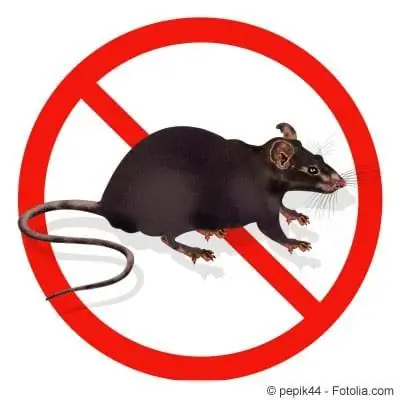
Encourage natural enemies
Cats are considered the ultimate rat catchers, although a cat is not a cat. There are certainly excellent hunters among them, but not everyone enjoys hunting. Anyone who has a hunter can consider themselves lucky. Pure domestic cats are not suitable for this. If you have a rat problem and don't want to get a cat yourself, it's better not to drive away the neighbor's cats, but rather let them do their "work". Dogs are also suitable for driving away rats. In most cases, their repeated or, better yet, long-term presence is sufficient. Maybe you have someone with a dog in your circle of friends or relatives who can stop by regularly.
Ferrets are also helpful, as are foxes, martens and raccoons, but these animals cause other problems and you don't want to burden them with them either.
Live Traps
If there are only individual animals, they can be captured if possible. In families, you usually only catch one rat with the trap. The rest of the squad learns from this one's mishap. You won't fall into the trap anymore. You can try changing the bait or the shape of the trap, but as already mentioned, rats are extremely clever.
Peanut butter, chocolate or nougat cream are particularly suitable as bait. Since rats like to use the same paths, always along the walls and edges, where they leave trails of smear and droppings to mark their territory, that's where it makes the most sense to set the trap. After a rat has been caught, you can set the trap again somewhere else. You won't catch a rat on the same one again.
Dispel by smell
Rats have very fine noses. They can therefore be spread with strong smells, although this works better in a building than in the garden. However, if the animals have chosen a shed, the floor above the garage or the garden shed as their home, then smells are helpful. Essential oils work well, as do crushed fresh spices. Recommended are:
- Various citrus scents
- Peppermint
- Clove
- Pepper
- Hot chili powder
- Turpentine
- Vinegar Essence
- Litter from a ferret cage
- Hair from dogs or cats
The agents should be applied to the rats' paths. When it comes to liquids, especially turpentine and vinegar essence, cloths should be soaked in them. These are pushed into the rat burrows. Rats get used to smells quite quickly, even if they are unpleasant. It's relatively difficult to get rid of rats with scent alone, but it's definitely worth a try.
Litter and fur hair should be placed in close-meshed mesh bags.
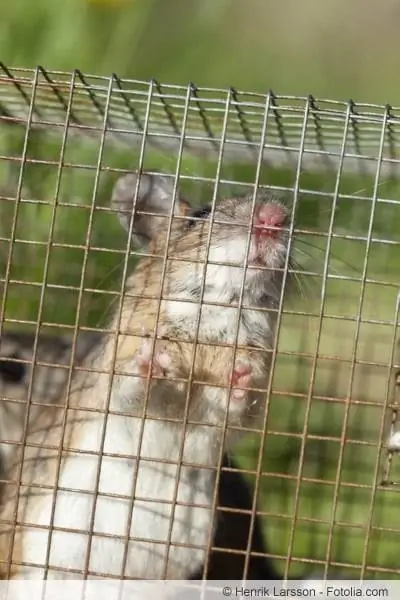
Ultrasound
It sounds tempting to drive away rats with the help of acoustic signals that cannot be heard by the human ear. You simply plug the devices into a socket and you should get rid of the rats. Unfortunately, the devices do not deliver what they promise. There are some who rid individual rooms of the house of rodents, but usually only temporarily until the animals get used to the noise or tone. Medium performance devices are generally almost ineffective. If the sound pressure is over 120 decibels, i.e. very high, some rats really can't tolerate it. The sound can be compared to a jackhammer, of course to the human ear. The question that arises is, how do other living beings perceive this sound? What happens to pets like dogs or cats? Some animal lovers keep rabbits or turtles in their garden, what about them? Or with birds?
Overall, there are doubts about the effectiveness of ultrasound devices, whether they are used against rats, moles, martens and the like. Sometimes one of the animals disappears, but it has not yet been proven whether this is due to ultrasound. You can save money on such a device for the garden.
Even if you have initial success with the device, the rats will get used to the sound very quickly. It can be helpful if you can change the frequency.
Is it poison?
Although rat poison is quick and easy to use, very effective and available almost everywhere, it has serious disadvantages. Firstly, it is not a pleasant death for the rats; they often suffer for a long time. They like to withdraw, often into unreachable spaces. There they decay, with all the smells, insects and liquids that go with it. In addition, poison usually only kills one rat; the others learn from this fate. What speaks absolutely against poison is that it is also poisonous for other living beings, especially your own or other people's children, pets, free-roaming cats and others.
Attention
It is also an unnecessary torture to use porridge mixed with plaster as bait. The plaster causes severe digestive problems and if the animals have ingested enough of it, it can also lead to death. The plaster hardens inside. The remaining rats will avoid the porridge.
Rats are not only smart, but also very adaptable. What one member of the rat family learns is passed on to the others. A rat infestation is therefore difficult to get under control. Catching or driving away individual animals is much easier. The safest thing to do is to do everything you can to prevent pests. Where rats do not find a suitable environment with quiet corners with all sorts of rubbish, and where there is no food, they take a maximum of a short rest before moving on. So if you don't leave anything edible lying around or standing around and keep your house, garden and everything that goes with it clear and tidy, you will rarely have a rat problem.

